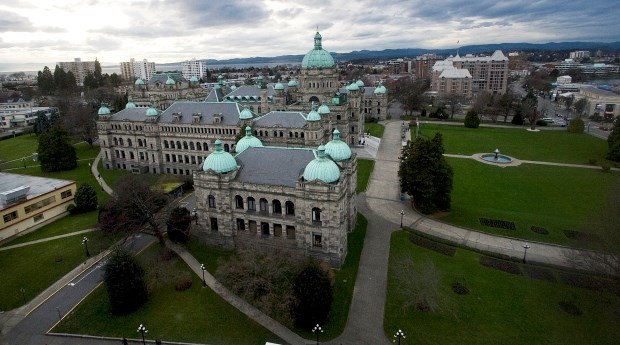The B.C. Green Party, which holds the balance of power in the legislature, has made its choice, which will probably see New Democrat John Horgan moving into the premier’s office before much longer.
Details to come.
Those missing details are crucial. Some we will know Tuesday, some will be revealed in a week or more, and some — the public’s view of a minority government, for one thing — will remain a mystery until the next election.
The notion of a minority government working across party lines in the public interest is a refreshing one, and should be welcomed. Can the politicians deliver?
The B.C. Liberals are in a minority with 43 seats, the NDP is in a minority with 41 seats, and the Greens have three. With Green Leader Andrew Weaver promising to support the NDP on confidence matters — the votes that could cause a government to fall — the New Democrats have the upper hand.
Premier John Horgan, it’s time for your closeup.
But not so fast. Liberal Leader Christy Clark, who had also been wooing the Greens, is not a political neophyte. Don’t count her out yet; she could argue that in a divided house, she should retain the right to form a government, and she could try to convince Lt.-Gov. Judith Guichon to give her that chance.
If Clark hangs on, however, she will likely be defeated by the Horgan-Weaver alliance the first chance they get, no matter how much they natter on about the entire legislature working together.
Back up a bit. Guichon will also hear from Horgan, who will argue that he controls 44 seats, one more than the Liberals, and therefore his NDP-Green alliance (as opposed to an outright takeover, or even a coalition) should have a crack at running the show.
On numbers alone, Horgan wins, so let’s assume he will become premier. When a Speaker is elected from his ranks, the NDP-Green team will be down to 43 seats, the same as the Liberals, and barring absences, our legislature will be tied. The Speaker will be called upon to break those deadlocks.
But the Greens don’t believe that MLAs should be required to always vote the party line. Horgan has said there is nothing in the alliance agreement to prevent Greens from supporting Liberal proposals.
The Green policy is that it does not force MLAs to vote in a particular way, unlike other provincial and federal parties, which “whip” their members to vote according to the party’s dictates. Party discipline is the way leaders maintain coherent policy and ensure they can deliver the votes they need at crucial times.
The Greens’ code of conduct for MLAs says: “The only issues on which the Green Party of B.C. requires caucus agreement on how to vote are explicit votes of confidence. Otherwise, the Green Party of B.C. has a policy of free votes in the B.C. legislature, including the budget.”
The policy, in keeping with the party’s attitude to democracy, presents few problems for a party where its votes don’t affect the outcome of legislation. But suddenly, the Greens are a third party whose votes matter a lot.
Budgets and confidence votes aside, MLAs deal with bills on issues from liquor control to workplace regulation to health care. Getting those passed would require Green support. Will Horgan have to wonder before every vote whether the needed votes will materialize?
Expect to see the Greens’ free-vote policy evaporate before long. But if it doesn’t — could it spread to the NDP? If so, that will add another level of uncertainty.
Will every Island New Democrat get a cabinet post?Not a chance. How will Horgan deal with the disaffected? Before the election, there were rumours that a couple of them would switch to municipal politics. Given that they have safe seats, any byelection would not likely change the party standings — unless, that is, voters are fed up with the way the minority government is being run.
Weaver has said that he wants voters to see that a minority is not something to be afraid of, and that proportional representation can work. And that raises another key point.
The Greens believe that the government should simply impose on the voters a change in the way we vote. In 2009, 60 per cent of voters rejected a shift from the first-past-the-post system, but the Greens have realized that small parties will always have trouble being elected under that system.
Democracy be damned, they say; let’s just do it.
The New Democrats have also argued for a change, but believe it should be put to a vote, not forced. Has the NDP caved to the Green demands? In theory we will know Tuesday, when the full terms of the pact are to made public.
If the deal calls for passing electoral reform legislation without consulting voters, or if neither Horgan or Weaver will rule that out, Clark should ask Guichon for an election on the issue. It is that important.
Weaver says his three-person caucus has already ratified the new accord, and Horgan’s team will vote Tuesday, although he has promised that they will vote yes.
The May 9 general election will have repercussions for many months to come. There is still much we don’t know, including the name of the next premier.
Weaver made a point of saying that he wants stability, and he wants to see a government that can last for the full four-year term.
We’d like to see that as well. But we’re not betting on it.
The devil, as they say, is always in the details.



